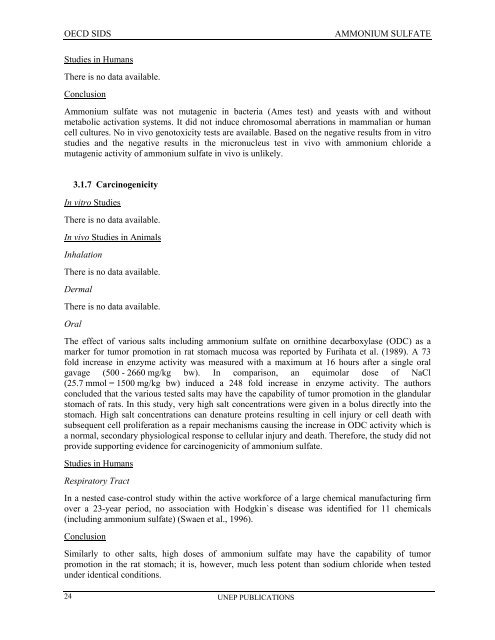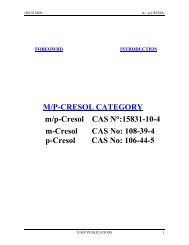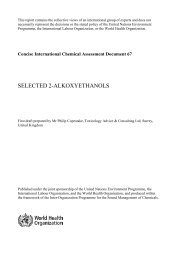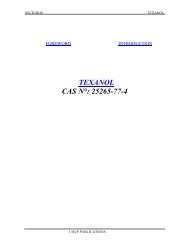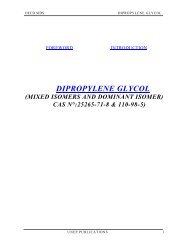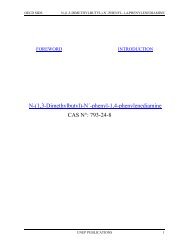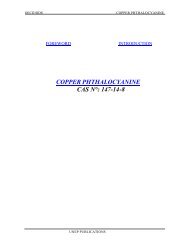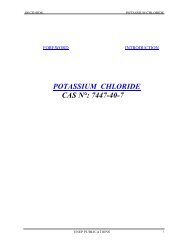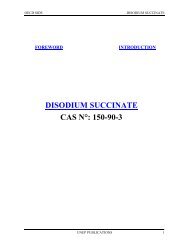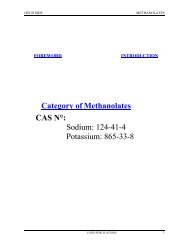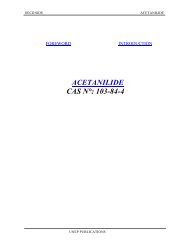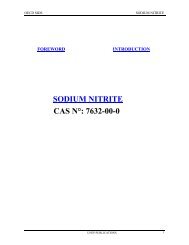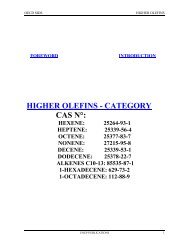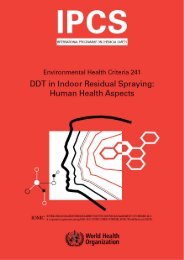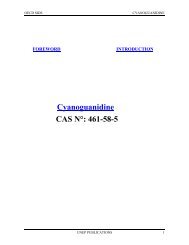AMMONIUM SULFATE CAS N°: 7783-20-2
AMMONIUM SULFATE CAS N°: 7783-20-2
AMMONIUM SULFATE CAS N°: 7783-20-2
Create successful ePaper yourself
Turn your PDF publications into a flip-book with our unique Google optimized e-Paper software.
OECD SIDS<br />
<strong>AMMONIUM</strong> <strong>SULFATE</strong><br />
Studies in Humans<br />
There is no data available.<br />
Conclusion<br />
Ammonium sulfate was not mutagenic in bacteria (Ames test) and yeasts with and without<br />
metabolic activation systems. It did not induce chromosomal aberrations in mammalian or human<br />
cell cultures. No in vivo genotoxicity tests are available. Based on the negative results from in vitro<br />
studies and the negative results in the micronucleus test in vivo with ammonium chloride a<br />
mutagenic activity of ammonium sulfate in vivo is unlikely.<br />
3.1.7 Carcinogenicity<br />
In vitro Studies<br />
There is no data available.<br />
In vivo Studies in Animals<br />
Inhalation<br />
There is no data available.<br />
Dermal<br />
There is no data available.<br />
Oral<br />
The effect of various salts including ammonium sulfate on ornithine decarboxylase (ODC) as a<br />
marker for tumor promotion in rat stomach mucosa was reported by Furihata et al. (1989). A 73<br />
fold increase in enzyme activity was measured with a maximum at 16 hours after a single oral<br />
gavage (500 - 2660 mg/kg bw). In comparison, an equimolar dose of NaCl<br />
(25.7 mmol = 1500 mg/kg bw) induced a 248 fold increase in enzyme activity. The authors<br />
concluded that the various tested salts may have the capability of tumor promotion in the glandular<br />
stomach of rats. In this study, very high salt concentrations were given in a bolus directly into the<br />
stomach. High salt concentrations can denature proteins resulting in cell injury or cell death with<br />
subsequent cell proliferation as a repair mechanisms causing the increase in ODC activity which is<br />
a normal, secondary physiological response to cellular injury and death. Therefore, the study did not<br />
provide supporting evidence for carcinogenicity of ammonium sulfate.<br />
Studies in Humans<br />
Respiratory Tract<br />
In a nested case-control study within the active workforce of a large chemical manufacturing firm<br />
over a 23-year period, no association with Hodgkin`s disease was identified for 11 chemicals<br />
(including ammonium sulfate) (Swaen et al., 1996).<br />
Conclusion<br />
Similarly to other salts, high doses of ammonium sulfate may have the capability of tumor<br />
promotion in the rat stomach; it is, however, much less potent than sodium chloride when tested<br />
under identical conditions.<br />
24<br />
UNEP PUBLICATIONS


